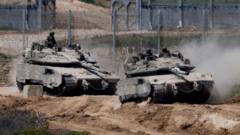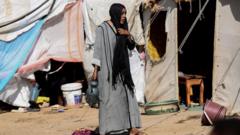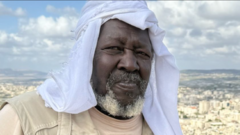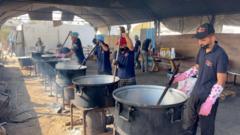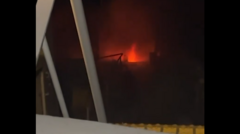As Israel readies a significant troop mobilization, the ongoing conflict continues to stress humanitarian resources and elicit diverse global reactions.
Israeli Military Mobilizes Reservists for Escalated Operations in Gaza
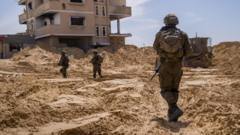
Israeli Military Mobilizes Reservists for Escalated Operations in Gaza
Tensions soar as Israel amplifies military offensives in Gaza while facing internal and international scrutiny.
The Israeli military has initiated a call-up of tens of thousands of reservists as part of its strategy to escalate operations against Hamas in Gaza. The Israel Defense Forces (IDF) stated that the goal is to "intensify and expand" their efforts, namely to put more pressure on Hamas and ensure the release of hostages. Military spokespersons indicated that operations would extend to new locations and aimed to eliminate both above-ground and underground infrastructure associated with Hamas.
The security cabinet of Israel was reportedly set to vote on this military expansion in the coming days, reflecting growing urgency within the government. Since resuming offensives on 18 March after a two-month ceasefire collapsed, no hostages have been freed. The end of the truce has resulted in significant territorial gains for Israel, leading to the displacement of a large number of civilians in Gaza.
In response to the re-intensified conflict, the Israeli government enforced a blockade on Gaza on 2 March, halting the import of essential goods, including food, medicines, and fuel. This blockade has raised alarms among humanitarian organizations, many of which report dwindling supplies and increasingly desperate conditions as mass starvation looms, a situation that could constitute a war crime under international law.
Israeli officials have articulated that the military campaign's endgame is securing the remaining 59 hostages held by Hamas, among whom 24 are believed to be alive. However, dissent is brewing among Israeli reservists, some of whom have urged Prime Minister Benjamin Netanyahu’s administration to shift focus from warfare to negotiating for the hostages' release.
This internal discontent has mirrored wider societal unrest, with protests erupting across Israel. Public sentiment is far from unanimous; demonstrators, including a mother of a hostage, labeled the conflict a "needless war." Concurrently, reports indicate two additional Israeli soldiers were killed as fighting continues.
Meanwhile, the escalating situation has also led to regional tensions, evidenced by a missile fired from Yemen landing near Israel's Ben Gurion airport. In Gaza, the Hamas-run health ministry reported 40 casualties and 125 injuries from the preceding 24 hours, further emphasizing the humanitarian toll of the conflict.
This military initiative follows a severe cross-border attack on 7 October 2023, which had devastating immediate effects, including the deaths of around 1,200 individuals and the kidnapping of 251. To date, the humanitarian crisis has deepened in Gaza, with estimates from the Hamas-run health ministry reporting over 52,535 deaths, including 2,436 since Israel resumed its offensive.
As the situation develops, stakeholders both locally and globally await the Israeli government's next moves and consider broader implications for peace and security in the region.
The security cabinet of Israel was reportedly set to vote on this military expansion in the coming days, reflecting growing urgency within the government. Since resuming offensives on 18 March after a two-month ceasefire collapsed, no hostages have been freed. The end of the truce has resulted in significant territorial gains for Israel, leading to the displacement of a large number of civilians in Gaza.
In response to the re-intensified conflict, the Israeli government enforced a blockade on Gaza on 2 March, halting the import of essential goods, including food, medicines, and fuel. This blockade has raised alarms among humanitarian organizations, many of which report dwindling supplies and increasingly desperate conditions as mass starvation looms, a situation that could constitute a war crime under international law.
Israeli officials have articulated that the military campaign's endgame is securing the remaining 59 hostages held by Hamas, among whom 24 are believed to be alive. However, dissent is brewing among Israeli reservists, some of whom have urged Prime Minister Benjamin Netanyahu’s administration to shift focus from warfare to negotiating for the hostages' release.
This internal discontent has mirrored wider societal unrest, with protests erupting across Israel. Public sentiment is far from unanimous; demonstrators, including a mother of a hostage, labeled the conflict a "needless war." Concurrently, reports indicate two additional Israeli soldiers were killed as fighting continues.
Meanwhile, the escalating situation has also led to regional tensions, evidenced by a missile fired from Yemen landing near Israel's Ben Gurion airport. In Gaza, the Hamas-run health ministry reported 40 casualties and 125 injuries from the preceding 24 hours, further emphasizing the humanitarian toll of the conflict.
This military initiative follows a severe cross-border attack on 7 October 2023, which had devastating immediate effects, including the deaths of around 1,200 individuals and the kidnapping of 251. To date, the humanitarian crisis has deepened in Gaza, with estimates from the Hamas-run health ministry reporting over 52,535 deaths, including 2,436 since Israel resumed its offensive.
As the situation develops, stakeholders both locally and globally await the Israeli government's next moves and consider broader implications for peace and security in the region.



